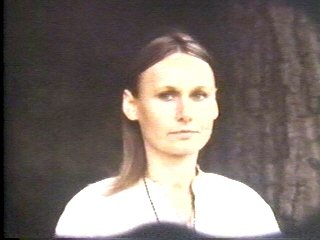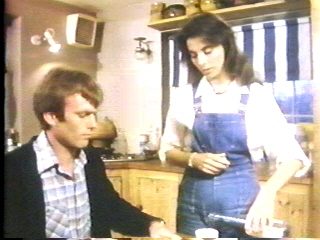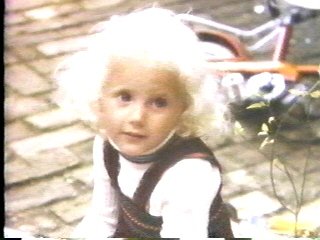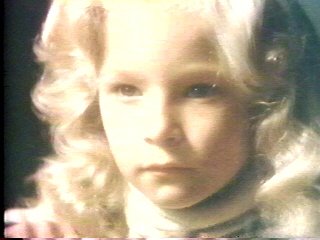
|
|
|
|
|
|
|
|
|
|
|
|
||||||||||||
|
(1980) Director: Gabrielle Beaumont
It was around 1982 to 1983 that Menahem Golan and his cousin Yoram Globus really captured the attention of not just the American audience, but the world audience. More specifically, it wasn't the men themselves, but the films they were producing in their studio, Cannon Films. The '80s were a record time for investment in American independent film production, and the Go-Go boys had seized the opportunity from the get-go. Thanks to all that available money, as well as getting major studio MGM to sign an agreement with them so they would better distribute much of their product stateside, in those particular two years they had box office success around the world with movies such as The Last American Virgin, Hercules, and Revenge Of The Ninja. Times then were rosy for Cannon; in fact, if the Go-Go boys from that point on decided to slowly grow bigger from their then success instead of overextending themselves, there is a good chance Cannon might still be around today. (But that's another story.) Anyway, what many people who enjoy or are familiar with Cannon films like myself (a pizza, beer, and a cheesy Cannon movie will give this Cannonholic a perfect Friday night) forget or simply don't know is that the Go-Go boys were active in producing (and with Golan sometimes even directing and/or writing) movies long before that particular period. Their trek to the shores of Hollywood was a long one,
really began in the late '60s when they were still in their native
Israel. First they started creating movies exclusively for their local
market, which were eagerly embraced by an audience hungry for movies
about themselves and their stories. Of course, the profits from these
productions enabled them to make more right into the '70s. Most of
these remain obscure outside of Israel even today, but they managed to
start selling some of these overseas (including the Lemon
Popsicle series and Operation Thunderbolt)
to even greater profits. With even
more cash in hand, they started to dabble in the more Well, why not? The drive-ins and the grindhouses were still alive and raking in cash at that time, so in 1980 they released, chiefly to those two particular markets, their first personally-produced Hollywood movies. Of course, one of those first movies released was The Happy Hooker Goes Hollywood, no doubt made to ensure audiences the Cannon tradition was continuing. You might have heard of that movie, as well as their legendary disco musical The Apple. But... do you know of their other movies of that year? Schizoid? Seed Of Innocence? Dr. Heckyl & Mr. Hype? Probably not. There was one additional Cannon movie released that year, though it's not the one being reviewed for The Unknown Movies' contribution to the Golan-Globus roundtable. Just kidding - that sixth movie was indeed The Godsend. It actually seems to have been intended from the start to be more mainstream than the other Cannon movies of that year. For one thing, it was an adaptation of a respected novel (written by Bernard Taylor, whose later novel Mother's Boys was also turned into a movie.) Also, it was given some money for its budget, evident from the first few minutes of English scenery shot from helicopters that plays under the opening credits. Though not long after the credits end, it's clear that we are watching yet another movie "inspired" by The Omen - so even this film couldn't totally escape from all of Golan and Globus' trademark touches - namely, jumping onto a tiring or utterly dead trend. In fairness, although The Godsend may
be inspired by The Omen, it does at the very least set
up the situation in an intriguing manner. The camera immediately swoops
down after the conclusion of the opening credits to introduce us to the
Marlowe family, consisting of patriarch Alan (Stoddard - who?),
matriarch Kate (Hayman - who?), and their four children, one of them
just a few months old. Engaged in a hike across the English
countryside, on their way home Kate spots a mysterious pregnant woman
(Angela Pleasence, daughter of Donald.) She befriends this unnamed
woman, and Now if this was the real world, no doubt the baby would immediately get taken by the child welfare authorities, and subsequently be placed with foster parents (who had been already assessed and registered by the authorities) for a brief period before being given to an adoptive parent or parents who had already spent time being assessed and placed on a waiting list. But since this is a movie, and only ten minutes or so have passed, Kate and Alan not only get to keep the baby for the moment, but are able to get in line and jump ahead so that in short time they are now the legal parents of this infant, who they name Bonnie. And just in time, as it turns out. Shortly after being given custody of Bonnie, their original infant dies, for reasons never revealed, in the crib it was sharing with Bonnie (cheap bastards!) Oh well, they seem to more or less think, at least we can start fresh with this new baby! (Unfeeling bastards!) But as the years pass and Bonnie gets older, more misfortunes befall on the Marlow family. One son mysteriously drowns in a river during a family picnic. Another son mysteriously dies after falling in a barn. In both cases, there is irrefutable evidence that Bonnie was around the two boys during their deaths, but neither Alan nor Kate see anything suspicious. Alan only starts suspecting something may be up when the string of tragedy turns more personal - that is, when he sees evidence that Bonnie made him sterile(!) I will admit that there was something about that
last-mentioned sequence that gave me the shivers and made me curl up
into a ball while I was seated in my La-Z-Boy, despite there also being
a good measure of utter ludicrousness to be found in that same scene.
Aside from that moment, however, there is really nothing frightening or
even creepy to be found in The Godsend. One immediate
stumbling block is that there is none of the content one usually
associates with this kind of horror - or with Golan and Globus, for
that matter. There are only a few drops of blood, and Of course, a movie doesn't necessarily need such exploitive material to be frightening; for example, The Other managed to be disturbing and chilling despite its PG rating. Though if you want to try and scare your audience more by the power of suggestion than with blood and guts, you have to work hard at tapping into what people in general consider to be either scary or disturbing. For example, I think most people would agree that seeing a child get murdered would be very disturbing to witness, even if the context is a fiction film. I am also confident that these same people would also agree that seeing a child as a murderer in any situation would be equally uncomfortable to witness. So considering the subject matter of The Godsend, it seems reasonable that if the movie chooses to avoid using any blatant kind of exploitation, that it would instead try to shake its audience by portraying multiple examples of those two uncomfortable scenarios. But as I already mentioned, the movie stubbornly refuses to show this. Until near the end, the murder sequences are never seen, and the lone exception is so incompetently filmed that it's laughable, especially in one particular shot when a really obvious mannequin is used for substitution. Naturally, since the murder scenes are never shown, we don't get to see Bonnie committing the deadly deed. (Come on, isn't it obvious she is guilty?) Often in a movie, one way to understand the character of a murderer is by seeing them "in action", so one of the keys to possibly understanding Bonnie is lost as a result. But even when you look elsewhere in the movie, there is very little that not only makes Bonnie horrific, but a character. One thing most viewers won't be able to ignore before the movie is even half over is the surprising amount of time she is off-screen. When she does appear, she has little to no dialogue, actually speaking for the very first time around the half hour mark. The little that she does say never at any time sounds like what an ordinary little girl would say to her parents, or that of an especially malevolent person, child or adult. The two girls cast to play Bonnie (only one of which has an additional acting credit apart from this movie) at different points of time are cute enough, and are able to give a good glower when the camera gets close to their face at key moments, but I can't really judge their performances because of those previously mentioned limiting circumstances. As for the rest of the cast, well, let's just say after watching Hayman, Stoddard, and Barr performing, the reason why they are not known (at least on these shores) become really clear. The only member of the cast who managed to catch my attention was Angela Pleasence. Though she is only in the movie for a few minutes and doesn't have a lot of dialogue, her vacant stares and mysterious-sounding voice actually make her character both haunting and intriguing, enough so that you soon wish the movie was about her instead. The blame for the almost complete failure of The
Godsend actually shouldn't fall on But the biggest problem with Beaumont's direction isn't that she couldn't make the movie look good, but that she has no sense of how to tell this story in an engaging way - key sequences abruptly end in midstream, suddenly cutting to several days afterwards in the future. Because of this, we don't get to see how characters immediately reacted to what had been happening, and they almost seem to be acting like nothing happened. That's bad enough, but what's worse is that, believe it or not, nothing of real significance happens apart from those few sequences. Beaumont seems aware of this at times, being so desperate that at one point she has a long scene with a character engaged in a daydream that is about as blatant as padding can get. Not only that, she throws in a stupid "shock" ending that not only is utterly lame, but makes the movie feel even more unfinished than how it felt from the previous scene. Admittedly, Beaumont was hampered by the fact the Marlowe family, despite being a larger family than the norm, didn't have enough potential victims to spread out over 90 minutes. Perhaps if the family involved in this movie had been the Brady one, especially if cousin Oliver was there, there wouldn't have been that problem. Even if the problem still remained, I somehow have the suspicion that The Godsend still would have been much more entertaining than it is now. 
Check for availability on Amazon (VHS) See also: Clownhouse, Daddy's Girl, The Other |
 lucrative
business of co-productions with outside countries. Some of these films
include the Richard Roundtree caper flick Diamonds, and
the Jack Palance gangster comedy-drama The Four Deuces. By
1979, the cousins felt ready to take the next step: conquer America. To
make it easier to set up shop in America, they bought an already
existing distribution company, Cannon. Established in the late '60s,
Cannon was a distributor associated up to that point almost exclusively
with bottom-barrel exploitation product - films like Cherry Hill
High and The Happy Hooker Goes To Washington.
With the Go-Go boys claiming new ownership and wanting to show
Hollywood its force, what did they then have Cannon subsequently
release? Yep - more bottom-barrel exploitation product!
lucrative
business of co-productions with outside countries. Some of these films
include the Richard Roundtree caper flick Diamonds, and
the Jack Palance gangster comedy-drama The Four Deuces. By
1979, the cousins felt ready to take the next step: conquer America. To
make it easier to set up shop in America, they bought an already
existing distribution company, Cannon. Established in the late '60s,
Cannon was a distributor associated up to that point almost exclusively
with bottom-barrel exploitation product - films like Cherry Hill
High and The Happy Hooker Goes To Washington.
With the Go-Go boys claiming new ownership and wanting to show
Hollywood its force, what did they then have Cannon subsequently
release? Yep - more bottom-barrel exploitation product!  welcomes her into their
house for the evening. The strange woman proves to be equally strange
in personality, not knowing how to handle the Marlow baby yet telling
Kate and Alan that her pregnancy is not her first ("I have others," she
sighs in her constant monotone voice.) Just before leaving, and after
secretly severing the Marlowe's phone connection, she goes into labor,
and by the time Alan returns from picking up the doctor (Barr - who?),
Kate has successfully assisted the mysterious woman in giving birth to
a healthy baby girl. "I'd like a cigarette," is the woman's bland
response to this joyous news. She is refused cigarettes, which might
explain why the next morning Kate discovers that the woman has vanished
and left her baby behind.
welcomes her into their
house for the evening. The strange woman proves to be equally strange
in personality, not knowing how to handle the Marlow baby yet telling
Kate and Alan that her pregnancy is not her first ("I have others," she
sighs in her constant monotone voice.) Just before leaving, and after
secretly severing the Marlowe's phone connection, she goes into labor,
and by the time Alan returns from picking up the doctor (Barr - who?),
Kate has successfully assisted the mysterious woman in giving birth to
a healthy baby girl. "I'd like a cigarette," is the woman's bland
response to this joyous news. She is refused cigarettes, which might
explain why the next morning Kate discovers that the woman has vanished
and left her baby behind. except
for one moment, death happens off-screen, being discovered minutes
after the fact. One other horrific moment, where none of the characters
dies, not only happens off-screen but is revealed over a day after the
fact, maybe because what happened is a total rip-off of something that
happened in The Omen. For that
matter, there's no bad language, no nudity, and the one scene of
"cuddling" has the same intensity of such a moment filmed for a
television show in the 1970s. (Incredibly, despite being almost free of
naughty stuff, the movie still got slapped with an R rating, no doubt
further pissing off the few grindhouse and drive-in patrons who paid to
see it.)
except
for one moment, death happens off-screen, being discovered minutes
after the fact. One other horrific moment, where none of the characters
dies, not only happens off-screen but is revealed over a day after the
fact, maybe because what happened is a total rip-off of something that
happened in The Omen. For that
matter, there's no bad language, no nudity, and the one scene of
"cuddling" has the same intensity of such a moment filmed for a
television show in the 1970s. (Incredibly, despite being almost free of
naughty stuff, the movie still got slapped with an R rating, no doubt
further pissing off the few grindhouse and drive-in patrons who paid to
see it.) Golan and Globus. Most of the
problems can be traced directly back to director Gabrielle Beaumont.
Though the cousins were often notorious penny-pinchers, I still cannot
help but think Beaumont blew most of the budget on those pretty opening
helicopter shots (as well as later helicopter footage of London)
because the remainder of the movie comes across as particularly shabby,
even when compared to other drive-in and grindhouse movies of the time.
The visual look is soft and blurry, even when it isn't one of those
times the lens is smeared with Vaseline. While you might think that the
decision to shoot inside real houses and other buildings might give the
setting a more authentic feel, instead you feel extremely
claustrophobic with the actors and props all squeezed tightly together
as a result, not to mention the movie's generally poor lighting and
badly-recorded audio gets aggravated further as a result.
Golan and Globus. Most of the
problems can be traced directly back to director Gabrielle Beaumont.
Though the cousins were often notorious penny-pinchers, I still cannot
help but think Beaumont blew most of the budget on those pretty opening
helicopter shots (as well as later helicopter footage of London)
because the remainder of the movie comes across as particularly shabby,
even when compared to other drive-in and grindhouse movies of the time.
The visual look is soft and blurry, even when it isn't one of those
times the lens is smeared with Vaseline. While you might think that the
decision to shoot inside real houses and other buildings might give the
setting a more authentic feel, instead you feel extremely
claustrophobic with the actors and props all squeezed tightly together
as a result, not to mention the movie's generally poor lighting and
badly-recorded audio gets aggravated further as a result.